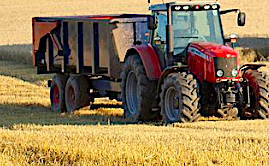The National Farmers Union in Scotland has called on Scotland’s booming food and drink sector to address the growing imbalance between the profitability enjoyed by retailers and processors and the returns for farmers.
The plea followed latest figures from Scotland’s Chief Statistician that showed incomes of commercial farms in Scotland fell 48% in the last year.
Estimates from the Scottish Government’s annual Farm Business Survey (FBS) showed that the average Farm Business Income (FBI) in Scotland was £12,600 in 2015-16, a drop of £11,500 from the previous year.
Indeed, since a peak in income in 2010-11, commercial farm income in Scotland has decreased 75% in real terms.
“Scottish Government states that when converting farm income estimates to hourly income for unpaid labour — such as farm owners, family members and business partners — the income generated from almost two-thirds of farm businesses wouldn’t have been enough to meet the legal minimum agricultural wage for paid workers,” said NFU Scotland in a statement.
“The union is calling on Scotland’s booming food and drink sector to address immediately the growing imbalance between the growth and profitability being enjoyed by retailers and processors and the returns to those producing the raw materials at the farm gate.
“The farm income figures also bring into sharp focus the need for post-Brexit farm policy and support structures that will secure profitability and stability at farm level.”
NFU Scotland director of policy Jonnie Hall said: “These bleak income figures provide hard evidence of the sustained financial damage to farm businesses across a range of sectors.
“Anecdotal comments and suspicion around how difficult it has been for farms and crofts to make a profit in recent times are now backed by fact.
“The viability, let alone profitability, of every Scottish farming business relies on three cogs working together – costs, markets and support.
“Given the deterioration in farm incomes, the evidence is now clear that no part is currently working for farmers or crofters.
“Whether producing livestock, crops, milk, poultry, pigs, fruit or veg, farmers and crofters continue to face rising input and compliance costs, declining market returns and an erosion of support payments that are conspiring to threaten the very existence of many.
“These figures highlight the absolute requirement to drive down all costs, ensure a much fairer share of the margins in the supply chain to the primary producer, and the vital need for governments to commit to ongoing support targeted at active farm businesses.
“As we enter a period of even greater uncertainty, with the potential to further undermine confidence, it is essential that producers are given unequivocal signals that new trading deals and support arrangements will put the prosperity of farming businesses top of the agenda.
“There is also a further onus on those further up the food and drink chain to urgently address the imbalances.
“Scotland’s food and drink sector, lauded for its ongoing success and ambitious targets, must start to deliver for those at the farm gate and who have seen their incomes fall by more than 75% since the start of the decade.”
